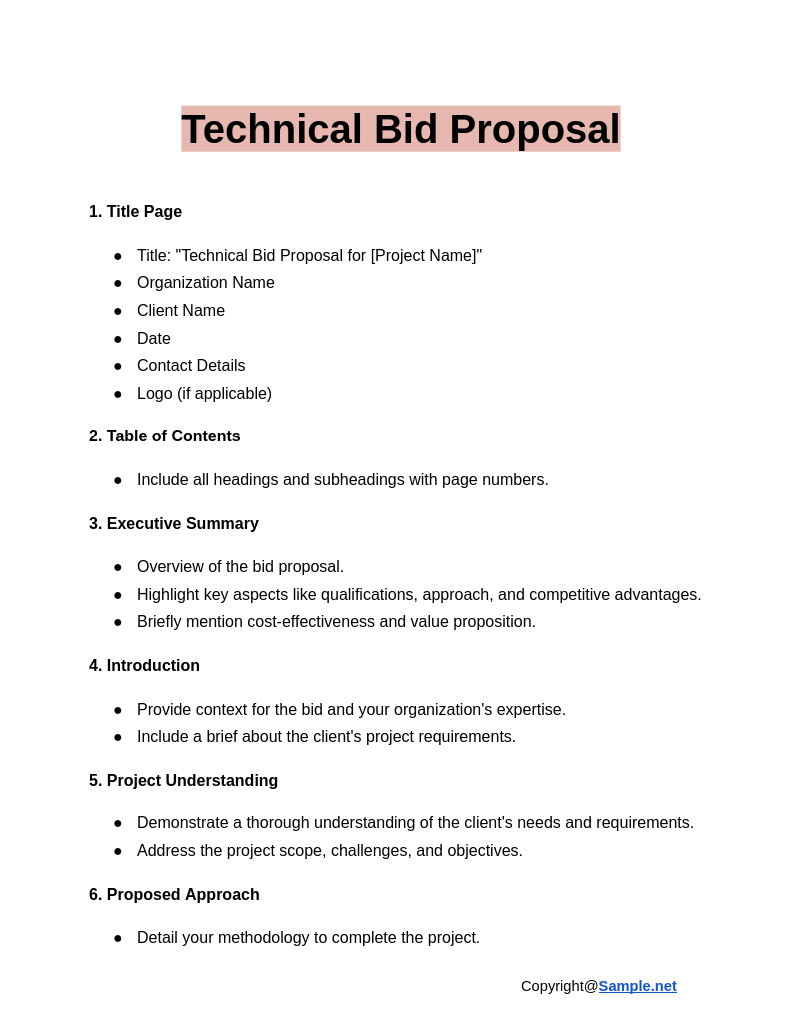Technical Proposal Samples
37+ Sample Technical Proposals
-
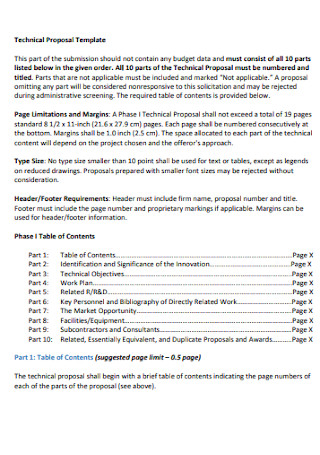
Sample Technical Proposal Template
download now -
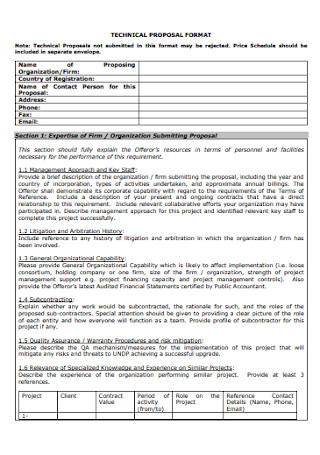
Technical Proposal Format
download now -
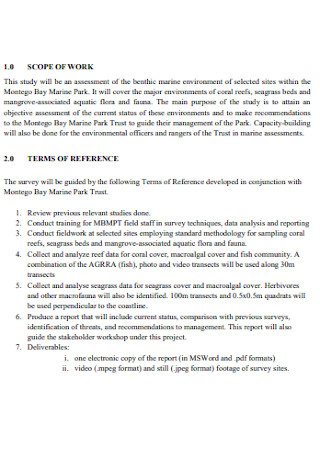
Technical and Financial Proposal
download now -
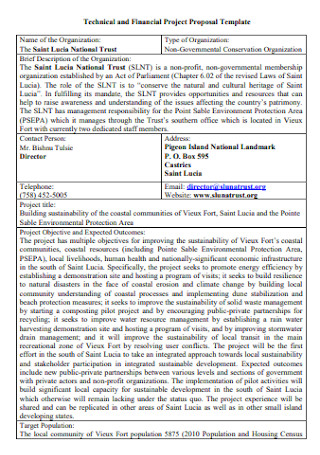
Project Technical and Proposal Template
download now -
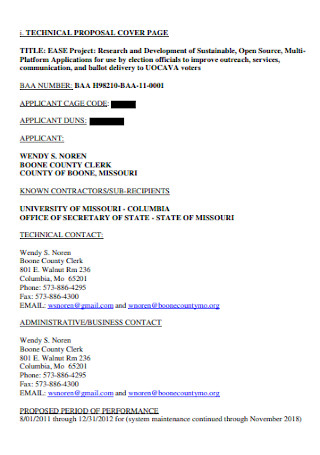
Technical Proposal Cover Page Template
download now -
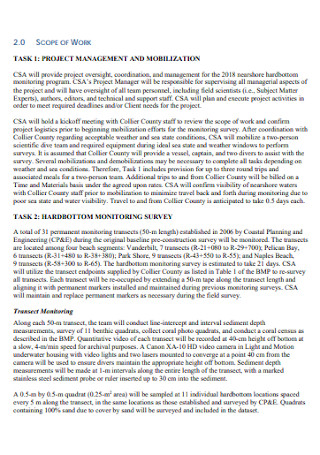
Technical and Commercial Proposal
download now -
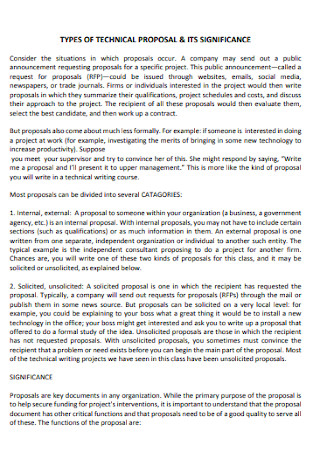
IT Technical Proposal Template
download now -
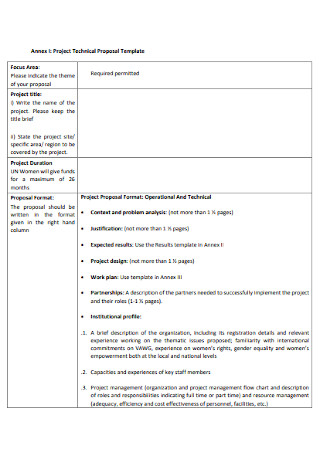
Project Technical Proposal Template
download now -
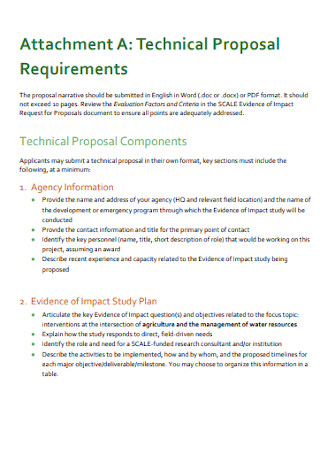
Technical Proposal Requirements Template
download now -
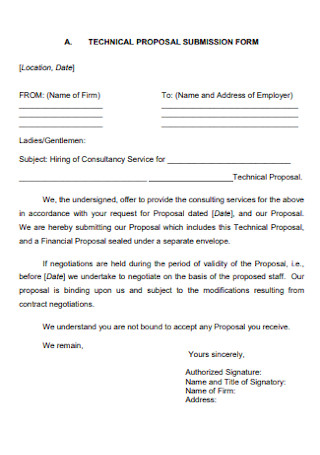
Technical Proposal Submission Form
download now -
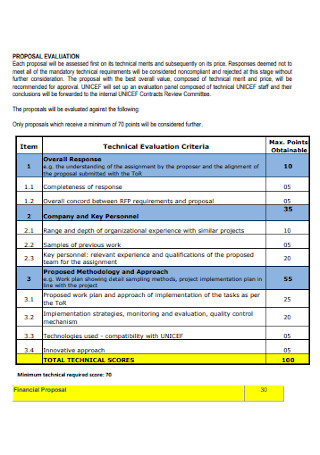
Technical Evaluation Proposal Template
download now -
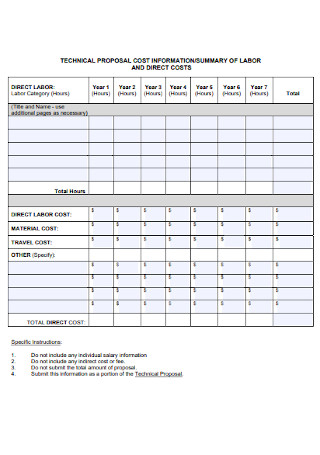
Technical Proposal for Cost Template
download now -
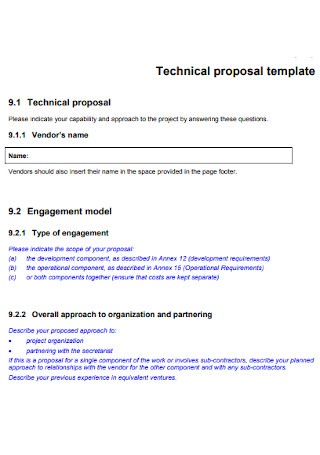
Simple Technical Proposal Template
download now -
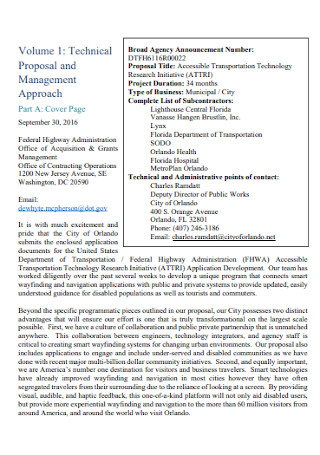
Management Technical Proposal
download now -
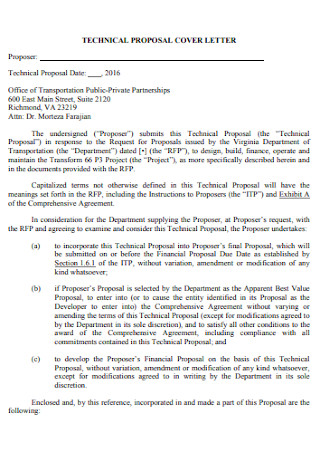
Technical Proposal Cover Letter
download now -
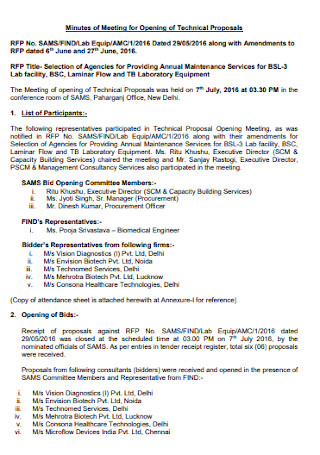
Meeting for Opening of Technical Proposals
download now -
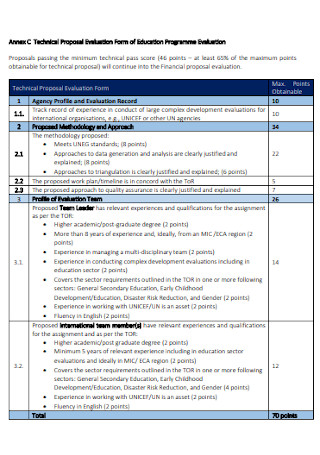
Education Technical Proposal
download now -
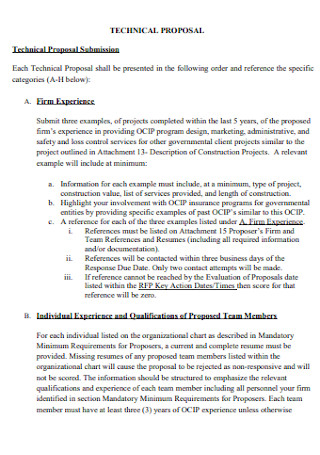
Basic Technical Proposal Template
download now -
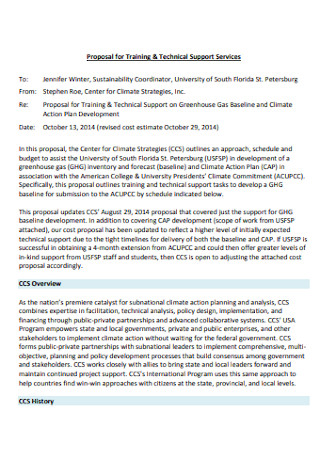
Technical Training Proposal Template
download now -
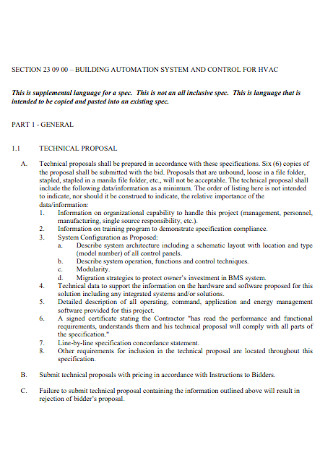
Building Technical Proposal Template
download now -
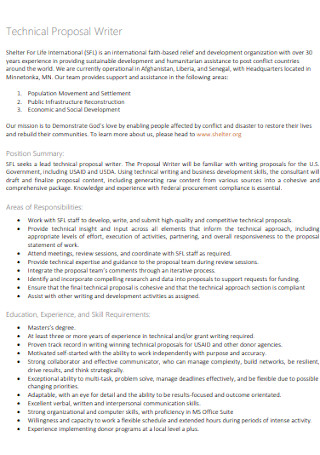
Technical Proposal Writer Template
download now -
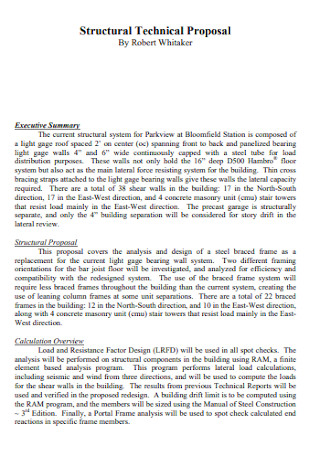
Structural Technical Proposal
download now -
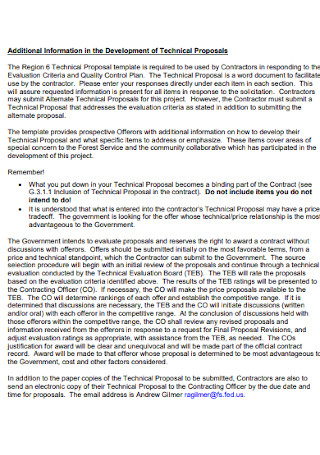
Additional Technical Proposals
download now -
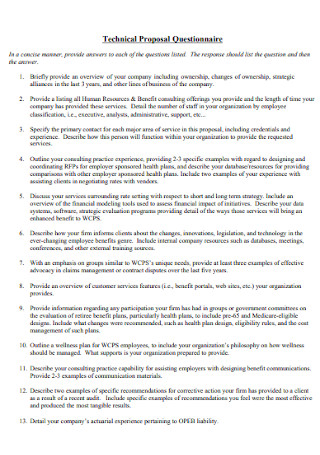
Technical Proposal Questionnaire
download now -
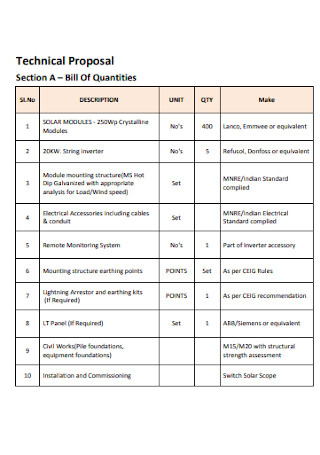
Solar Technical Proposal Template
download now -
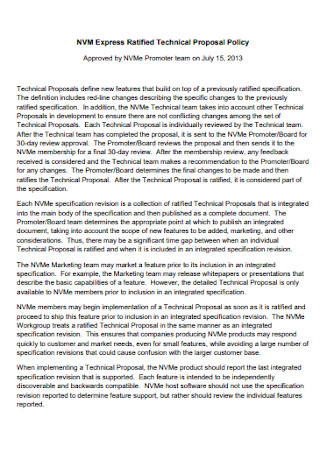
Technical Proposal Policy Template
download now -
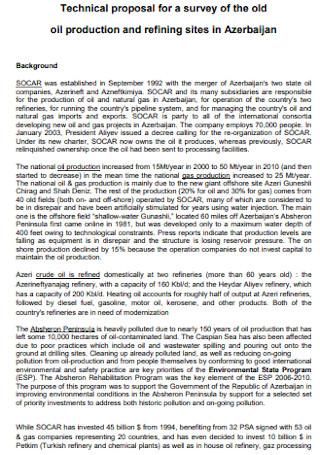
Technical Proposal for Survey
download now -
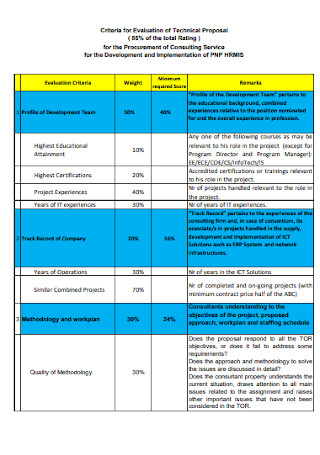
Technical Proposal Checklist
download now -
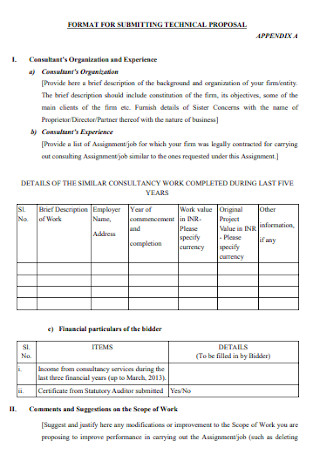
Technical Submitting Proposal Format
download now -
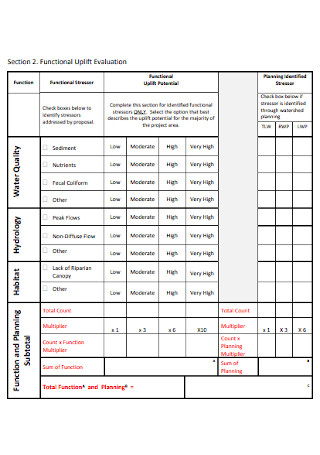
Technical Proposal Rating Form
download now -
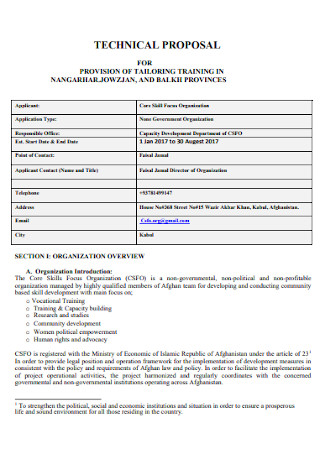
Tailoring Training Technical Proposal
download now -
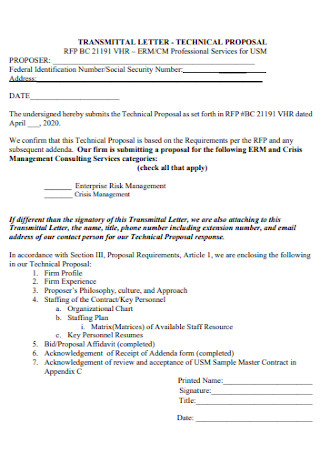
Technical Proposal Transmittal Letter
download now -
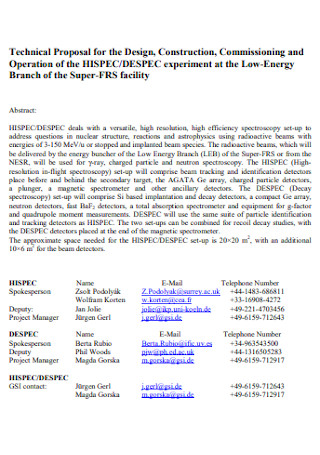
Construction Technical Proposal Template
download now -
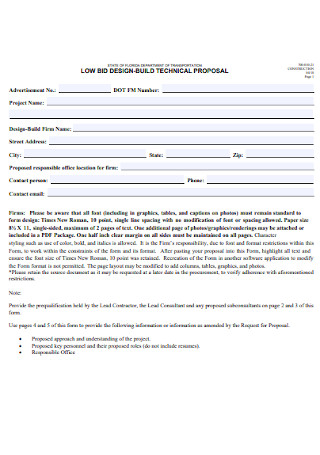
Design Build Technical Proposal
download now -
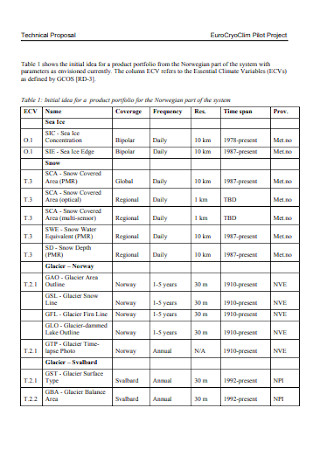
Technical Proposal Technical Proposal
download now -
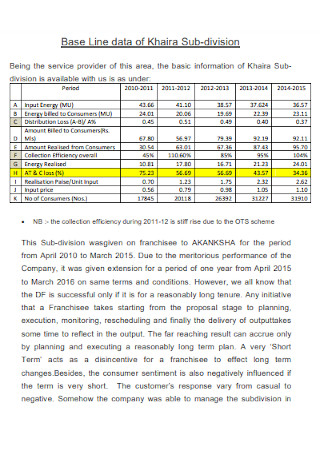
Distribution Technical Proposal
download now -
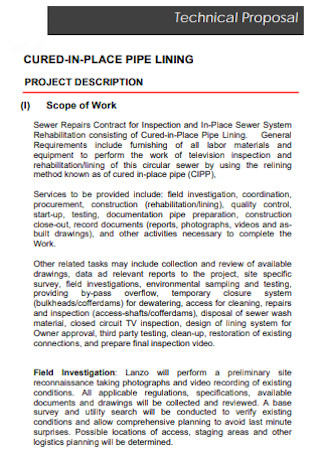
Pipe Lining Technical Proposal
download now -
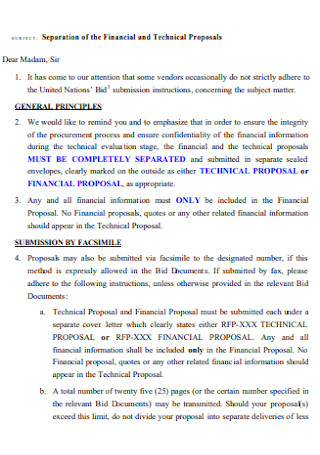
Financial and Technical Proposals
download now
Technical Proposal
Technical Proposal Format
Technical Proposal Samples
37+ Sample Technical Proposals
What is a Technical Proposal?
Technical Proposal Examples
How to Write a Technical Proposal
FAQs
What are the different types of technical proposals?
What are the major parts of a technical proposal?
What are some examples of technical proposals?
How to create a technical research proposal?
What are the fundamental principles of technical writing?
How is a Technical Proposal different from a Business Proposal?
Technical Proposal Format
1. Title Page
- Title of the Proposal
- Organization Name
- Client Name (if applicable)
- Date
- Contact details (phone number, email, and address)
- Logo (if available)
2. Table of Contents
- Include all headings and subheadings with corresponding page numbers for quick navigation.
3. Executive Summary
- A concise overview of the entire proposal.
- Highlight the problem, proposed solution, objectives, and expected outcomes.
- Keep it brief and easy to understand.
4. Introduction
- State the purpose of the proposal.
- Briefly describe the background or context of the problem.
- Include the scope and limitations (if any).
5. Problem Statement
- Clearly outline the problem that needs to be addressed.
- Provide relevant data, statistics, or context to support the problem.
6. Objectives
- Clearly list the specific goals the proposal aims to achieve.
- Use bullet points or numbered lists for readability.
7. Proposed Solution
- Describe the solution or approach in detail.
- Include technical descriptions, frameworks, or methodologies.
- Highlight how this solution addresses the problem.
- If applicable, mention any tools, technologies, or innovations.
8. Project Scope
- Define the boundaries of the project.
- Detail what is included and excluded in the scope.
- Provide clarity on deliverables.
9. Implementation Plan
- Step-by-Step Approach: Break down the solution into phases or steps.
- Timeline: Provide an estimated timeline for each step or milestone.
- Team Involvement: Mention team roles and responsibilities.
10. Budget Estimate
- Provide a detailed cost breakdown.
- Include categories like labor, materials, tools, and other expenses.
- Add any justifications for cost estimations.
11. Risk Assessment
- Identify potential risks and challenges.
- Provide mitigation strategies for each identified risk.
- Highlight measures to ensure successful implementation.
12. Evaluation Metrics
- Define how success will be measured.
- Include quantitative and qualitative metrics (e.g., cost savings, efficiency gains, user satisfaction).
13. Conclusion
- Summarize the proposal.
- Reiterate the key benefits of the proposed solution.
- Include a call to action (e.g., request for approval, next steps).
14. Appendices (Optional)
- Include additional details, charts, diagrams, or supporting documents.
- References or citations (if applicable).
15. Contact Information
- Restate contact details for queries or discussions.
- Add names and roles of key personnel involved.
Technical Bid Proposal
Technical Consultant Proposal
Technical Due Diligence Proposal
Technical Research Proposal
What is a Technical Proposal?
A Technical Proposal is a formal document used to present a structured solution for a specific technical problem or project. It defines the objectives, scope, methods, technologies, and deliverables of the proposed solution. These proposals often serve as a blueprint to secure approval, funding, or partnerships. By focusing on detailed technical explanations, a Technical Proposal demonstrates an organization’s capability to achieve project success while aligning with the client’s requirements and expectations.
Technical Proposal Examples
Reports have shown that 61% of all grant seekers depended on only one or two people in the grant writing and submission process. One example of a technical proposal is a grant proposal. What are some common examples of technical proposals used by many project managers and other professionals?
1. Education Technical Proposal
An education technical proposal is a professional document used by educators, teachers, professors, and other academic professionals when proposing academic programs like an education program evaluation. Also referred to as a technical academic project proposal, it demonstrates the core points of the education program and the significance it brings to the students and teachers. If you are proposing an education program evaluation, include some details concerning the agency profile and evaluation record, proposed methodology and approach, profile of the education evaluation team, and their relevant experiences and qualifications for the assignment.
2. Construction Technical Proposal
Develop a striking construction technical proposal for your construction building project. It is a well-detailed building project proposal that gives a description of the proposed approach to managing the design, construction, maintenance, and other crucial activities of the construction project. When preparing a construction technical proposal, consider the audience while addressing each need that they have expressed, elaborating in clear terms on how the proposal fills their needs and explaining the relevance of technical data. Research the situation to clearly understand the needs of your customers and use visual aids such as charts, maps, and tables in your proposal.
3. Technical IT Consultancy Proposal
A technical IT consultancy proposal is a professional strategy consulting proposal that provides a full picture of what you intend to do in offering your consulting services to your prospective client. Before you start writing your technical IT consultancy proposal, consider what your prospect is looking for. For example, ask them if they are searching for an already-identified IT issue or simply looking for an outside assessment and better optimization of current IT systems. It is important that you define the main goals and objectives, consulting scope of work, IT needs of the client, recommendations, IT solutions, significance of your IT consultancy job, project timeline, next steps, terms, and conditions, etc.
4. Management Technical Proposal
Create a management technical proposal to establish your solution or project objective for your management. Add headings in the technical proposal such as introduction, the context of the project or executive summary, methodology, organization and staffing, and appendices. Include background information that is beneficial for the decision-makers. Define the project goals and objectives, as well as the critical tools and techniques to be utilized. Explain who are the people who will be involved with the project and how the management work would be organized. You may include other management teams like quality control management.
How to Write a Technical Proposal
An effective technical proposal is written by proposal managers and writers who have a perfect combination of technical writing skills, expertise, and organizational knowledge. If you want to hone your writing skills, learn the fundamental steps in writing a captivating and comprehensive technical proposal.
Step 1: Understand the Problem or Requirement
Begin by thoroughly analyzing the problem, requirement, or objective outlined by the client or stakeholders. Conduct research to understand the scope, constraints, and desired outcomes. This ensures your proposal directly addresses the key issues. Clearly defining the problem forms the foundation of a relevant and focused proposal.
Step 2: Outline the Technical Solution
Develop a detailed explanation of your proposed solution, including the technologies, methodologies, and processes involved. Highlight how your approach will address the problem effectively while meeting the client’s requirements. Include diagrams, flowcharts, or data to enhance clarity and demonstrate technical feasibility.
Step 3: Define the Scope and Deliverables
Clearly define the scope of the project, specifying what is included and excluded. Provide a detailed list of deliverables, including timelines and milestones. This ensures all stakeholders have a shared understanding of the project expectations and goals, reducing potential misunderstandings.
Step 4: Address Risks and Contingency Plans
Identify potential risks or challenges that may arise during project execution and propose contingency plans to mitigate them. This demonstrates your proactive approach to problem-solving and reassures stakeholders of your preparedness and reliability.
Step 5: Present the Budget and Timeline
Provide a realistic and transparent budget for the project, along with a detailed timeline. Break down costs into categories and align them with specific project phases or deliverables. Ensure the timeline is practical and includes milestones for monitoring progress.
FAQs
The different types of technical proposals are business proposals, sales and marketing proposals, thesis research proposals, product development proposals, financial proposals, design-build proposals, and education proposals. Business proposals are prepared for potential clients outside the company or prospective business partners. Research proposals are written by professors, investigators, and institutions to obtain a grant in response to a certain request or announcement from the government or a different agency.
The major parts of a technical proposal are the abstract or executive summary, need statement, project activity, methodology, projected outcomes, evaluation methodology, dissemination, and project cost and continuation funding.
Some examples of technical proposals are technical financial proposals, technical commercial proposals, IT technical proposals, project technical proposals, technical evaluation proposals, technical cost proposals, management technical proposals, education technical proposals, technical training proposals, construction technical proposals, and design-build technical proposals.
When you create a technical research proposal, create a clear and appealing title in which you will highlight your proposed research work. Include the background and problems that your proposed business, project, or research will assess. Formulate some questions about problems and issues that will be explored and investigated throughout the proposed research. Outline the methodology of your research work as you provide details on the resources, methods, and discussion. Include a clear outline of the different stages and corresponding timelines for the development and execution of your research study. Add some critical references and sources if necessary.
The fundamental principles of technical writing are accuracy, accessibility, comprehensiveness, conciseness, correctness, and top-level page design. Make sure that your technical document like a technical proposal points out your purpose as you inform or persuade the reader. Consider the background and concerns of your target audience, especially their attitude toward your purpose. Write specific and well-defined content aligned with your purpose and audience. Write in an active voice and use proper language. Use eye-catching visuals in your graphics and page design. Also, always be ethical by stating the truth at all times.
What are the different types of technical proposals?
What are the major parts of a technical proposal?
What are some examples of technical proposals?
How to create a technical research proposal?
What are the fundamental principles of technical writing?
How is a Technical Proposal different from a Business Proposal?
A Technical Proposal focuses on the technical aspects of a project, detailing the solution, methodologies, and execution. A Business Proposal, on the other hand, emphasizes the commercial or strategic benefits, including ROI, marketing, and business impact.

